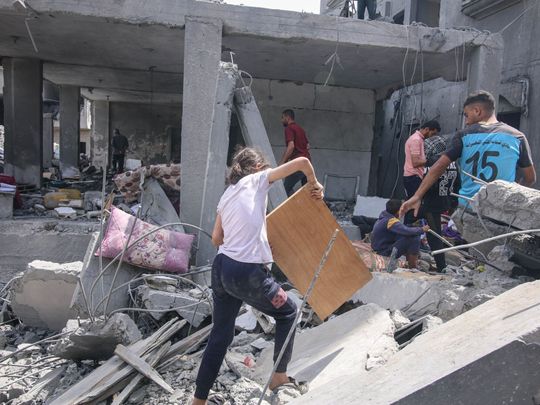
JERUSALEM: Israeli Prime Minister Benjamin Netanyahu vowed on Tuesday that the military would launch a ground offensive on Gaza’s far-southern Rafah city “with or without” a truce deal being negotiated with Hamas.
The hawkish premier issued the warning despite strong concerns raised by top ally Washington and hours before US Secretary of State Antony Blinken was set to arrive in Israel on his latest Middle East crisis tour.
“The idea that we will halt the war before achieving all of its goals is out of the question,” said Netanyahu, who was vowed to destroy Hamas over their October 7 attack that sparked the deadliest ever Gaza war.
“We will enter Rafah and we will eliminate the Hamas battalions there with or without a deal, in order to achieve the total victory,” he told families of some of the hostages still being held in Gaza, his office said.
Netanyahu’s comments came as Hamas was weighing the latest plan for a truce proposed in Cairo talks with US, Egyptian and Qatari mediators that had raised cautious hopes for an end to the fighting.
The Palestinian militant group said it was considering a plan for a 40-day ceasefire and the exchange of scores of hostages for larger numbers of Palestinian prisoners.
The Islamist group, whose envoys returned from Cairo talks to their base in Qatar, would “discuss the ideas and the proposal”, said a Hamas source, adding that “we are keen to respond as quickly as possible”.
Sources in Egypt earlier told Al-Qahera News, a site linked to Egyptian intelligence services, that Hamas envoys were due to “return with a written response”.
An Israeli official told AFP the government “will wait for answers until Wednesday night”, and then “make a decision” whether to send negotiators to Cairo.
‘Only obstacle’
Washington has heightened pressure on all sides to reach a ceasefire - a message pushed by Blinken, who was on his seventh regional tour since the war broke out.
Blinken, who arrived in Jordan from Saudi Arabia and was later heading to Israel for talks with Netanyahu and other officials on Wednesday, described Israel’s offer as “extraordinarily generous”.
Washington has strongly backed its ally but also pressured it to refrain from a ground invasion of Rafah, which is packed with displaced civilians, and to do more to protect the territory’s 2.4 million people.
President Joe Biden, facing rising fury on US university campuses, urged the Egyptian and Qatari leaders Monday “to exert all efforts to secure the release of hostages held by Hamas”.
Biden called this “the only obstacle” to securing relief for Gaza’s civilians, who the UN has warned are on the brink of famine.
Anger about the unprecedented scale of Palestinian suffering has sparked weeks of large-scale protests at universities across the United States and elsewhere, including in France and Lebanon.
New York’s Columbia University, the epicentre of the US protest movement, began suspending student demonstrators on Monday after they defied an ultimatum to disperse.
Children pulled from the rubble
As diplomacy continued, Israel kept up its bombardment that has flattened swathes of Gaza.
An AFP correspondent reported several air strikes in Gaza City, Khan Younis and Rafah as well as overnight artillery shelling.
The Israeli military said “fighter jets struck a number of terror targets in central Gaza”.
Palestinians in Rafah mourned the latest victims as children were being pulled from the rubble.
At Al Najjar hospital, grief-stricken relatives jostled over the dead, whose bodies were shrouded in white.
“We demand the entire world call for a lasting truce,” said one bereaved relative, Abu Taha.
The war started after Hamas’s October 7 attack on southern Israel resulted in the deaths of 1,170 people, mostly civilians, according to an AFP tally of Israeli official figures.
Israel’s retaliatory offensive has killed at least 34,535 people in Gaza, mostly women and children, according to the health ministry in the Hamas-run territory.
Palestinian militants also took some 250 hostages on October 7. Israel estimates 129 remain in Gaza, including 34 believed to be dead.
Unlike the group Netanyahu met with on Tuesday, which has advocated military action, many families of hostages have called on the government to secure their loves ones’ freedom in a truce deal.
At a news conference in Tel Aviv on Monday, Aviva Siegel - released during a November truce and whose husband Keith remains in Gaza captivity - urged “the leaders of the free world to help us bring our people home”.
Post-war statehood?
As the Gaza war has roiled the region and its human toll has sparked international outrage, political momentum has built in the search for a post-war solution to the wider Israeli-Palestinian conflict.
European and Arab foreign ministers met in the Saudi capital on Monday to discuss how to join forces on advancing a two-state solution.
Netanyahu and many members of his hard-right government oppose Palestinian statehood.
EU foreign policy chief Josep Borrell said he expected several European governments to announce their recognition of a Palestinian state within the next month, including Belgium, Ireland, Malta, Slovenia and Spain.
To provide Israel with an incentive to support a Palestinian state, Washington has pushed the prospect of normalised relations with Gulf kingpin Saudi Arabia, with Blinken suggesting that some progress was being made in that arena.
Saudi Foreign Minister Prince Faisal bin Farhan said that irreversible steps towards establishing a Palestinian state would be an essential component of any lasting ceasefire.
China meanwhile said that rival Palestinian groups Hamas and Fatah had met in Beijing recently for “talks on promoting intra-Palestinian reconciliation”.
Hamas seized sole control of Gaza in 2007, while Fatah maintains partial administrative control in the Israeli-occupied West Bank through the Palestinian Authority.
Chinese foreign ministry spokesman Lin Jian said “the two sides fully expressed their political will to achieve reconciliation”, without saying when they had met.












